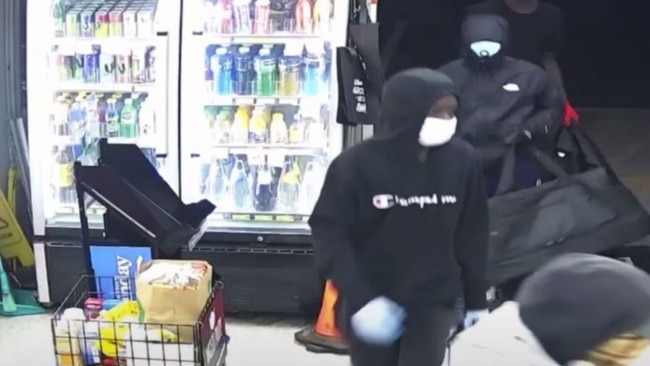Coles and retailers at centre of organised crime spree
Coles admits being swept up in a spike in theft from its stores, fuelled by a trend of organised crime rings that target specific items en masse to sell online.

The nation’s second largest supermarket chain Coles has admitted to being swept up in a massive spike in theft from its stores, fuelled by a growing trend of organised crime rings that perform ‘smash and grab’ raids and then sell their stolen loot on online marketplaces.
Coles chief executive Leah Weckert called out a growing theft problem during the retailer’s full-year results on Tuesday to blame a new and worsening crime spree for contributing to a 20 per cent increase in lost food and grocery stock.
Currently a plague in the US where retail experts there believe theft – or ‘shrinkage’ as it is often politely called – is now robbing stores of around $US100bn ($A156bn) a year, the phenomenon looks to have now washed up on Australia’s shores where retailers are reporting increasing cases of widespread theft.
But Ms Weckert has called out the growing influence of organised crime in store robberies that was a major reason for the 20 per cent lift in stock losses that also includes waste, damage and markdowns.
“We have seen a rising trend over the last nine months or so has been what we call stock loss and that is definitely theft which ranges from organised crime which is well co-ordinated and they are potentially taking a large number of the same products and then onselling it on marketplaces and the like,” Ms Weckert told The Australian.
“We are definitely seeing a trend of organised crime rising and we work quite closely with police in each different state and they tell us the number of reports that they have has significantly gone up over the last year.”
In the US leading retailers such as Walmart, Home Depot and Target have decried the theft crisis now hitting their stores and threatening staff. The old-fashioned image of a lone person smuggling a can of baked beans up their jumper has been replaced by highly organised crime gangs that use social media and smartphones to swarm a store, target key items and strip the shelves.
Recently general merchandise chain Target in the US warned that the retail crime spree would cost it as much as $US500m this year. In Australia the rising tide of retail theft has become so bad that the Australian Retailers Association, which represents the $400bn sector, recently set up a specially targeted Retail Crime Advisory Committee, a collaboration between retailers, government and police.
Ms Weckert said at her stores organised gangs were especially grabbing for high-value products in health, beauty and medicine, whereas lone shoplifters under cost of living pressures were stealing other goods.
“What organised crime is more interested in is more related to health and beauty or medicinal items, whereas customers that are struggling with balancing their budget and engaging in these types of behaviours are looking for things like meat or potentially products that they use around the home.”
To combat this Coles is investing heavily in technology such as CCTV cameras and cameras at the checkout counter, trolley locks, as well as special ‘smart gates’ at self-service checkouts that ensure groceries have been paid for. There is also the investment in traditional methods of crime prevention such as more security guards at stores.
“You’ll find security guards at a much larger number of our stores,” she said.
Cost of living pressures are not only driving more theft, but Coles research has found that young families and people aged under 34 are most under mortgage and rental stress to now greatly alter their buying habits to make savings on household budgets.
Ms Weckert said Coles research had shown that 90 per cent of Australian shoppers are claiming that they have made changes to their shopping behaviour, in terms of what they buy and when.
“That is definitely up on what we saw in the number of customers that were telling us that late last year.
“And that number is a little bit higher when it comes to those younger families, with young kids.
“They are looking to economise. They have a certain amount they know they can spend for the week and what they are looking to do is make all their meal occasions fit into that.”







To join the conversation, please log in. Don't have an account? Register
Join the conversation, you are commenting as Logout